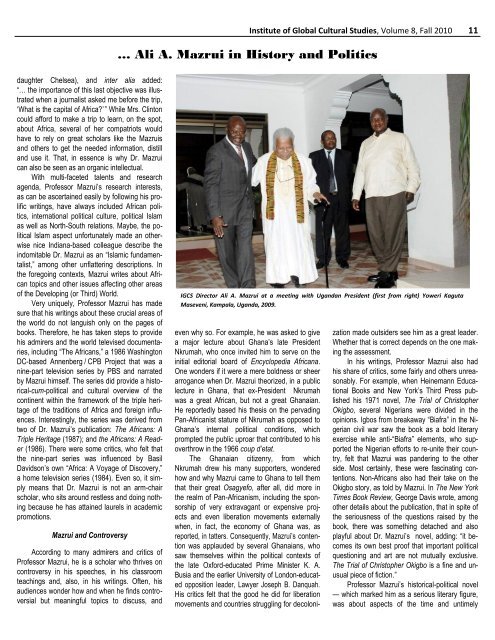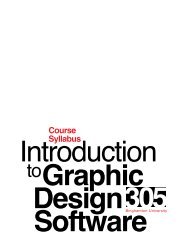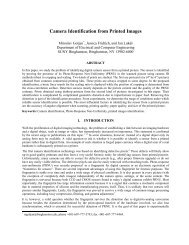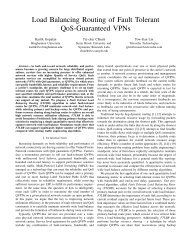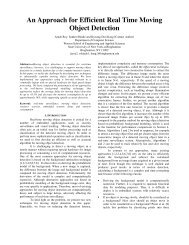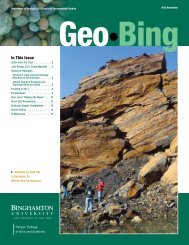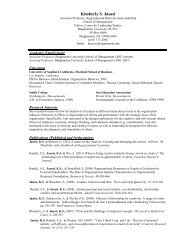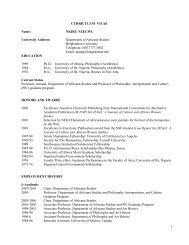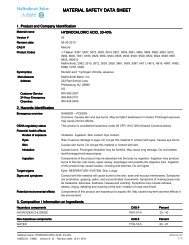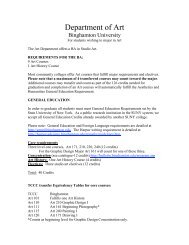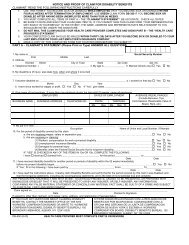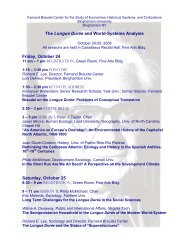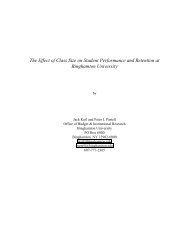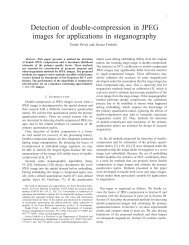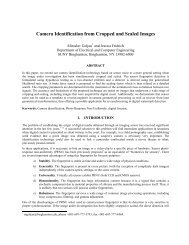10 Institute of Global Cultural Studies, <strong>Volume</strong> 8, <strong>Fall</strong> <strong>2010</strong>… Ali A. Mazrui in History and Politicsing descriptions. Sadly, some of these writerssuffered for their radical or ideological stancesand struggles in the interests of Africa as a continentand, to them, as a motherland. For example,Nkrumah, who was himself a prolific writerand a fierce fighter in the anti-colonial struggle inAfrica, suffered in a variety of ways. In the end,he had his elected government in Ghana overthrownon February 24, 1966 in a military-cumpolicecoup d’état that was, reportedly, engineeredby Western intelligence agencies (asdocumented in former CIA operative JohnStockwell‘s book, In Search of Enemies).As discussed in Kwame Nkrumah: PanafGreat Lives (1974) and in some of ProfessorMazrui‘s writings, Nkrumah eventually died inApril 1972 in faraway Bucharest, Romania, fromwhat Amical Cabral of Guinea-Bissau termed asa ―cancer of betrayal‖ (1974). Several other blackleaders and scholars, too, suffered in a variety ofways. For example, Finally They Killed Him(1980) was a book written by Nigerian scholars todocument several aspects of the brutal assassinationof Guyana‘s History Professor Walter Rodney,who penned How Europe UnderdevelopedAfrica (1968), a forceful indictment of Europeanforces that, in his opinion, kept Africa in the domainof what Conrad saw as a ―dark‖ continent;Dr. Mazrui has an affinity to him, including servingas a Rodney Professor in Guyana. Anotherblack nationalist scholar, who died from a mysteriousillness, was Franz Fanon, author of severalgreat works, including The Wretched of the Earth(1964).As the occupier of Albert Schweitzer EndowedProfessorship in the Humanities in theState University of New York (SUNY), with residenceat <strong>Binghamton</strong>, New York, Dr. Mazrui hasbenefitted from several prestigious invitations tocollege campuses. During such visits, he performsto his best and makes the name of Africashine, just as he did when, in 2009, his stellarachievements prompted the Indiana UniversityAfrican Students Association (IUASA) to bringhim to our campus. He held his large audiencespell-bound. It was similar to how both of us had,in an earlier period, successfully nominated andbrought on the Bloomington campus of IndianaUniversity (headed today by a stellar philosophyscholar, Provost Karen Hanson) two Nobel Laureates:Nobel Literature Laureate Wole Soyinkaof Nigeria and, later on, Costa Rican PresidentOscar Arias, the Nobel Peace Prize Laureate.In spite of Professor Mazrui‘s distinguishedPan-African scholarship and his ardent promotionof African culture, customs and ideals, he hasIGCS Director Ali A. Mazrui being awarded the Order ofthe Grand Companion of Oliver Tambo by former SouthAfrican President Thabo Mbeki, April 2007.had his share of African and diaspora-basedBlack critics for varied reasons. For example,some West African scholars, who admireGhana‘s late President Nkrumah (the Osagyefo)have never forgiven the famous Kenyan scholarfor writing an essay in the early years of TransitionMagazine, titled ―Nkrumah: The LeninistCzar,‖ which depicted Nkrumah as a ―Czar‖ ofsort in Africa. To such pro-Nkrumah critics ofMazrui, it was a ―how dare him‖ episodic issue.Yet, that did not dent the intellectual spirit or credentialsof Professor Mazrui, who had previouslybeen faulted because, to his ardent critics, hefirst rose to intellectual prominence by beingseen as a critic of some of the accepted orthodoxiesof African intellectuals between the 1960sand 1980s; he was also seen as an ardent criticof African socialism and Marxism, brands ofwhich Nkrumah as well as Tanzanian ex-PresidentJulius K. Nyerere and others practiced.Ali. A. Mazrui: Some Essential DetailsIn the 2005 global intellectual poll, ProfessorMazrui was ranked among 99 other distinguishedfigures, as being one of the world‘s top 100 publicintellectuals by readers of the United KingdombasedProspect Magazine and the WashingtonDC-based Foreign Policy Magazine. Yet, thosewho very well know the University of Oxford‘sNuffield College-educated political scientist add tothe public intellectual description a further descriptionof an ―organic intellectual.‖ In politicalscience dictum, it is Antonio Gramsci, who introducedthe concept, which has been applied toRodney in the superb writings of Caribbean‘sTrevor Campbell (1981); Horace Campbell (1991);and Nigeria‘s astute scholar, Biodun Jeyifo (1980).We have a purpose for adding the ―organicintellectual‖ accolade to Mazrui‘s public intellectualdistinction. In fact, we do not want to limithis intellectual precision and importance, hencewe have not added ―traditional intellectual‖ aspart of the accolade. For, as we understand itfrom Gramsci‘s perspective, traditional intellectualscan be seen as literary as well as scientificand religious persons, whose positions in intersticesof one‘s society has a certain inter-classaura about it. However, as Hoare and Smithhave been quoted as having underscored inLewis‘ book about Walter Rodney (1998), traditionalintellectual ―derives ultimately from pastand present class relations and seals an attachmentto various historical (and political) classforms.‖Instead, for various reasons, we see Dr.Mazrui as being both, a public intellectual and toa large extent, and an organic intellectual, especiallywith his contributions to Africa and the Developing(or Third) World. As variously amplified,the organic intellectual — of the Mazruian variation— happens to be, again in the words ofHoare and Smith (1978), the ever thinking andorganizing elements of a particular aura specificfundamental social class, who can be ―distinguishedless by their profession, which may beany job characteristic of their class, than by theirfunction in directing the ideas and aspirations ofthe class to which they organically belong.‖Unlike Rodney, who Columbia University ProfessorManning Marable (1986; 1987) as being partof the black intellectual tradition, Mazrui has afirebrand intellectual prowess as opposed toradical or revolutionary one.While Rodney and others used both astuteand propagandist scholarship in the interests ofblack people, Mazrui has purposely utilized hispolitical science expertise to bring Africa andother Developing (or Third) World areas into thefocus of the enlightened world. In fact, it is due tothe crusading writings of Mazrui and other blackintellectuals that is why today, we do not continueto hear some of the ridiculous questions of thepast about Africa; i.e., whether Africans live intrees, or whether Africans have tails, as depictedin some Tarzan movies. For example, in herexcellent memoirs, Living History (2003) — publishedimmediately after being America‘s FirstLady — U.S. Secretary of State, Hillary RodhamClinton, pointed out the importance of Americanslearning more about Africa. She was, indeed,pointing out several objectives for her fellowAmericans (before her departure for Africa, with
Institute of Global Cultural Studies, <strong>Volume</strong> 8, <strong>Fall</strong> <strong>2010</strong> 11… Ali A. Mazrui in History and Politicsdaughter Chelsea), and inter alia added:―… the importance of this last objective was illustratedwhen a journalist asked me before the trip,‗What is the capital of Africa?‘ ‖ While Mrs. Clintoncould afford to make a trip to learn, on the spot,about Africa, several of her compatriots wouldhave to rely on great scholars like the Mazruisand others to get the needed information, distilland use it. That, in essence is why Dr. Mazruican also be seen as an organic intellectual.With multi-faceted talents and researchagenda, Professor Mazrui‘s research interests,as can be ascertained easily by following his prolificwritings, have always included African politics,international political culture, political Islamas well as North-South relations. Maybe, the politicalIslam aspect unfortunately made an otherwisenice Indiana-based colleague describe theindomitable Dr. Mazrui as an ―Islamic fundamentalist,‖among other unflattering descriptions. Inthe foregoing contexts, Mazrui writes about Africantopics and other issues affecting other areasof the Developing (or Third) World.Very uniquely, Professor Mazrui has madesure that his writings about these crucial areas ofthe world do not languish only on the pages ofbooks. Therefore, he has taken steps to providehis admirers and the world televised documentaries,including ―The Africans,‖ a 1986 WashingtonDC-based Annenberg /CPB Project that was anine-part television series by PBS and narratedby Mazrui himself. The series did provide a historical-cum-politicaland cultural overview of thecontinent within the framework of the triple heritageof the traditions of Africa and foreign influences.Interestingly, the series was derived fromtwo of Dr. Mazrui‘s publication: The Africans: ATriple Heritage (1987); and the Africans: A Reader(1986). There were some critics, who felt thatthe nine-part series was influenced by BasilDavidson‘s own ―Africa: A Voyage of Discovery,‖a home television series (1984). Even so, it simplymeans that Dr. Mazrui is not an arm-chairscholar, who sits around restless and doing nothingbecause he has attained laurels in academicpromotions.Mazrui and ControversyAccording to many admirers and critics ofProfessor Mazrui, he is a scholar who thrives oncontroversy in his speeches, in his classroomteachings and, also, in his writings. Often, hisaudiences wonder how and when he finds controversialbut meaningful topics to discuss, andIGCS Director Ali A. Mazrui at a meeting with Ugandan President (first from right) Yoweri KagutaMaseveni, Kampala, Uganda, 2009.even why so. For example, he was asked to givea major lecture about Ghana‘s late PresidentNkrumah, who once invited him to serve on theinitial editorial board of Encyclopedia Africana.One wonders if it were a mere boldness or sheerarrogance when Dr. Mazrui theorized, in a publiclecture in Ghana, that ex-President Nkrumahwas a great African, but not a great Ghanaian.He reportedly based his thesis on the pervadingPan-Africanist stature of Nkrumah as opposed toGhana‘s internal political conditions, whichprompted the public uproar that contributed to hisoverthrow in the 1966 coup d’etat.The Ghanaian citizenry, from whichNkrumah drew his many supporters, wonderedhow and why Mazrui came to Ghana to tell themthat their great Osagyefo, after all, did more inthe realm of Pan-Africanism, including the sponsorshipof very extravagant or expensive projectsand even liberation movements externallywhen, in fact, the economy of Ghana was, asreported, in tatters. Consequently, Mazrui‘s contentionwas applauded by several Ghanaians, whosaw themselves within the political contexts ofthe late Oxford-educated Prime Minister K. A.Busia and the earlier University of London-educatedopposition leader, Lawyer Joseph B. Danquah.His critics felt that the good he did for liberationmovements and countries struggling for decolonizationmade outsiders see him as a great leader.Whether that is correct depends on the one makingthe assessment.In his writings, Professor Mazrui also hadhis share of critics, some fairly and others unreasonably.For example, when Heinemann EducationalBooks and New York‘s Third Press publishedhis 1971 novel, The Trial of ChristopherOkigbo, several Nigerians were divided in theopinions. Igbos from breakaway ―Biafra‖ in the Nigeriancivil war saw the book as a bold literaryexercise while anti-―Biafra‖ elements, who supportedthe Nigerian efforts to re-unite their country,felt that Mazrui was pandering to the otherside. Most certainly, these were fascinating contentions.Non-Africans also had their take on theOkigbo story, as told by Mazrui. In The New YorkTimes Book Review, George Davis wrote, amongother details about the publication, that in spite ofthe seriousness of the questions raised by thebook, there was something detached and alsoplayful about Dr. Mazrui‘s novel, adding: ―it becomesits own best proof that important politicalquestioning and art are not mutually exclusive.The Trial of Christopher Okigbo is a fine and unusualpiece of fiction.‖Professor Mazrui‘s historical-political novel— which marked him as a serious literary figure,was about aspects of the time and untimely


